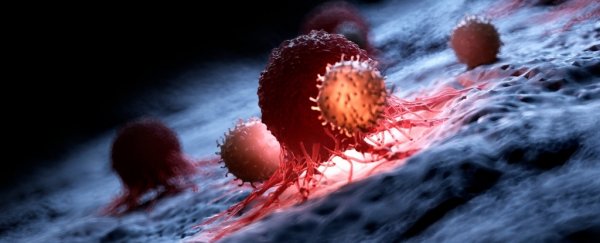Exercise might prevent some types of cancer from growing and spreading, and while scientists still aren't sure why that is, new research on mice offers a potential explanation.
After intense physical activity, elevated levels of certain metabolites, like lactate, might be 'feeding' important immune cells in our blood. The results are mainly based on experiments with mice, but preliminary tests in male humans suggests a similar mechanism could be at play.
"Our research shows that exercise affects the production of several molecules and metabolites that activate cancer-fighting immune cells and thereby inhibit cancer growth," says Helene Rundqvist, a cancer researcher at the Karolinska Institutet in Sweden.
Past research has shown that exercise is linked to a slightly lower risk of tumours in the bladder, breast, colon, kidney and stomach, and we have strong clinical evidence that physical movement can help some patients cope and recover. It might even extend their life.
Further research on animals has shown similar results, with regular exertion somehow reducing the growth of malignant tumours.
Still, the underlying mechanism behind this relationship has remained elusive. The cancer-fighting benefits of physical exercise could have something to do with changes in a person's weight, their hormones, or their immune system.
The new research investigates the latter possibility. Dividing cancerous mice into two groups - one with access to a spinning wheel, and another with no form of physical activity - researchers found that the mice that regularly exercised showed slower cancer growth and better rates of survival.
To achieve this, however, mice needed to be able to produce cytotoxic T-cells, which are the white blood cells specialised to attack cancer in the body. Without the ability to produce these important immune markers, physical activity was unable to suppress cancer growth to the same extent.
On the other hand, when mice with cancer weren't exercising, but instead got an injection of T-cells from exercising peers, their prospects generally improved.
"These results demonstrate that [cytotoxic T cells] are altered by exercise to improve their effectiveness against tumours," the authors write.
These changes appear to have something to do with lactate - a metabolite produced in the muscle during exercise, which later seeps into the blood.
In mice, metabolites linked to exercise increased by up to 8-fold following exercise. As expected, T-cells in the blood showed an increased uptake of these products.
The results support the findings of a prior study by some of the same authors, which discovered that lactate can help fuel T-cells in the blood, potentially increasing their "anti-tumour activity".
In this case, when mice were given daily, high-dosage injections of lactate alone, the animals showed an increase in T-cells within the tumour and a decrease in overall tumour growth, even without exercise.
"These findings indicate that lactate infusion mimics some of the effects of exercise, but that exercise has additional, integrative, components beyond merely increased levels of lactate," the authors write.
While research so far has mainly been focused on animal models, the new study conducted a preliminary test among humans that offered somewhat similar results.
Taking blood samples from eight healthy men before and after a 30-minute cycle, the team noticed an increase in some of the same elevated metabolites they saw in exercising mice.
If the same metabolites are increasing in humans like they do in mice, the team is hopeful that products of exercise like lactate may boost the immune system, making T-cells more effective at killing cancer in humans also, although more research is needed to investigate this link in our own species.
"We hope these results may contribute to a deeper understanding of how our lifestyle impacts our immune system and inform the development of new immunotherapies against cancer," says Rundqvist.
Although this is an exciting development, like most things in cancer research, exercise shouldn't be looked at as some kind of silver bullet.
For example, in a meta-analysis back in 2016, researchers found that among those that did the most physical activity in the study, their total cancer risk was reduced by 10 percent compared to those that did the least.
If your risk of developing cancer is 40 percent over a lifetime, however, that only changes your cancer chance from 40 percent to 36 percent – a significant reduction, sure, but also slight overall.
Still, if exercise really can modify the power of cytotoxic T-cells in humans, then mimicking its underlying effects may be one of the most promising routes for future cancer treatments. Now we just have to figure out how it works.
The study was published in eLife.
